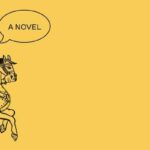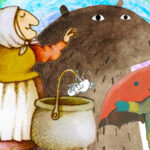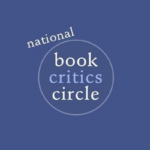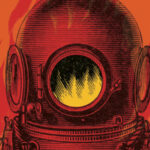What Booksellers Can Teach Us About Reading, Writing and Publishing
Will Mountain Cox Reflects on Creating Literary Culture and Community Across Continents
My longtime girlfriend is a longtime bookseller. Her relationship with bookselling predates ours three times over. It is a surprisingly taxing career path—one that asks of the body, and of the mind. There are the bad days, where she brings home the classic bookseller gripes: failed hand-sells, disappearing stock lost to The System, rude customers, sad customers, drunk second-hand book sellers, slow days, long shifts, stiff backs. There are days when she must play the power-lifter, the bouncer, the therapist, the academic, the smooth talking car salesman; sometimes all at once
But then there are the good days, when her shop simply hummmms, her colleagues in harmony with one another, and with the local community, and with the history of literature and with the obligatory playlists of Leonard Cohen, Nina Simone, and Mac DeMarco, days my girlfriend finds herself in what I imagine equates athletically to “being in the zone,” hand selling so well that a customer listens to recommendation after recommendation, buying them all, asking for more.
Bookselling is a polar, problematic lover, an insistent poly-amant shoving its way, tome by tome, into her and my monogamy. It is also a job that I have come to appreciate for what bookselling—even through a conduit—has taught me about books, about writing, about containers of literary creation, yes, but also as aesthetic objects in and of themselves, and still more, as sources of dense, talismanic energy that pulls a community towards a real, physical place.
*
My partner is the most recent in a long line of booksellers who taught me not only how to write, but how to keep physical literature alive. I do not have a formal creative writing education, but I did loiter (and sometimes live) in bookshops across the Old World and the New.
Recently I published my first novel and was sent on my first book tour, to do bookshop events across Europe and the UK. At a stop on the tour, I was met with a comment from an audience member that, “the writing seems good, for someone who didn’t do an MFA.” The commenter did not elaborate if this was meant as the greatest compliment or the most savage diss. However meant, it was nonetheless correct, and I was left to contemplate, in front of an audience, my alternative literary education.
Sitting next to me, moderating the conversation, was Terry Craven, longtime bookseller, co-owner of Desperate Literature in Madrid. Terry felt like a fateful presence in the face of such a statement. When I first moved to Paris ten years ago, Terry—then the manager of Shakespeare & Company—was instrumental in sending me down a literary path.
For a short time before he left for Madrid, I found myself as Terry’s assistant on his secondhand book buys. This meant invading mansion-sized Parisian apartments owned by the freshly dead, apartments filled with incredible book collections whose inheritors wanted nothing to do with their boxing up and schlepping (enter me). Rumor would go around that a new stash was up for grabs and Terry and I needed to get in before the hoards of other antiquarian book dealers descended to ravage the loot. It was all very Bolaño-eat-your-heart-out.
Terry would always give me “my cut” from a haul, usually some beautifully aged Penguin paperback like Woolf’s To the Lighthouse, saying, “learn from this,” without elaborating on what or why. And by allowing me into his exciting, mysterious, and hectic existence, an existence centered around books, an existence I saw him allowing his customers access to as well, I not only learned from his book recommendations, but also from how his celebration of the theatrical, wilder-than-fiction bookselling image was an experience book buyers came looking for.
*
In the years that followed, as I moved around and tried to make my way in the world, I found myself under the tutelage of more and more booksellers, not only receiving their book recommendations, but also by trying to read the humanist lines running between them.
I am reminded of Karolina Brdak, Octavia Horgan, and Sylvia Whitman—the holy trinity of the Shakespeare & Company shop floor in the early 2010s—who, in managing a shop steeped in history, taught me both how to believe in literary legends and how, if I wanted to write, I needed to move beyond them. As booksellers drowning in Hemingway kinks and Fitzgerald fantasies, it was all the more powerful when they insisted I read writers like Ali Smith, Elena Ferrante, and Jennifer Egan.
I am reminded of the likes of Jacob Perkins and Matt Nelson at the sadly gone Mellow Pages Library, and Chad Bunning at the sadly gone BookCourt, both in New York City, where I ended up for a time after having my luck, and my money, run out in Europe. These three introduced me to the work of writers my own age, young people being celebrated—an act which not only removed barriers in taking my writing more seriously, but which also motivated me to take my reading more seriously, in search, thereafter, of younger writers writing ‘our time’ with prescience.
And I am reminded of the likes of Kevin Sampell at Powell’s in Portland, where I am from, and then Nina Hervé at Rough Trade Books and Gavin Read at Foyles, two crucial London booksellers who looked after me when I moved briefly to the UK, after starting a literature magazine with the English writer, James Bird.
All three of these booksellers gave our little magazine pride of place in their iconic shops, alongside other small, new, local projects. It was an act that taught me how highlighting your community, especially the next generations of writers and readers, can be just as important and just as profitable as serving your major publishers and distributors.
*
My girlfriend currently finds herself in a moment of doubt about her craft, about what will be asked of booksellers in the years to come.
On our downtime during our book tour travels, we often found ourselves in yet more bookshops, talking to yet more booksellers. Many of them were green literary entrepreneurs, part of the string of new independent bookstores to have flouted the industry’s grim projections and opened their dream businesses; a group that is growing in number in the U.S. and in the U.K. for the first time in two decades.
In meeting so many booksellers and seeing inside so many new shops, patterns began to emerge.
Most new bookshops are now also bars, or cafes, or community meeting places, or micro-theaters. New booksellers are now also bartenders, or artisan bread bakers, or grassroots organizers, or stage auteurs. Sometimes all four and more.
Natalie Magnusson, who owns Bokbar, a Nordic bookshop in Paris, has a growing Swedish bakery business, combining Nordic literature-in-translation with Nordic pastry-pairings for a growing number of Nordiphile Parisians.
To afford rising rents, bookshops are diversifying, some even beginning to publish books themselves, by writers from their community, published with their local customer-base in mind first and foremost.
Sam Fisher, one of the co-founders of Burley Fisher in London, has been publishing a new generation of writers through his own publishing house, Peninsula Press, which leverages his bookshop’s community to drive sales and engagement at a shop that is staffed by an ambitious team of booksellers directly involved with various cultural and political initiatives in London, who themselves manage a bare-bones basement bar out of a GDR fantasy, perfectly decorated for cultural and political debates.
And some booksellers are fighting to make the publishing industry itself match their more inclusive, accessible, communitarian image.
With narratives providing their livelihood, booksellers begin to see which narratives their customers need.The aforementioned Terry Craven, along with Desperate Literature co-owner Charlotte Delattre, has founded the highly successful Desperate Literature Short Story Prize, which has quickly become an international stalwart for literary career launching, deftly linking writers, agents, workshops and residencies, shining light on promising stories and promising writers, and creating a system outside the standard academic, MFA churn, one that guarantees an alternative entry point into the literary ecosystem.
*
In reflecting on the booksellers as educators, it makes sense that they may be tasked with additional roles as our publishers and our publicans, but more generally as bastions of community in the increasingly lonely, increasingly anxious, increasingly anonymous social space.
With narratives providing their livelihood, booksellers begin to see which narratives their customers need, the needs changing over time, the needs contingent on the last narrative their customer consumed, whether that be literary, political, social or otherwise. And booksellers are aware of a need to attract and please new readers (of any age) and younger readers and infant communities and difficult customers, to win over trust, to found more human loyalties.
Booksellers understand the importance of maintaining mystery, in not always being so clear, in refusing to answer every question, so that readers are allowed to retain agency in their discoveries, so that readers can narrate their own fate, so that reading can retain adventures of the mind, a type of adventure that, when trained correctly, spills more often from the page into the real world and makes life more livable.
So it comes as no surprise, to me then at least, that in these uncertain times, by earning their livelihood in direct contact with society-as-readership, with readership-as-unfulfilled-customer, booksellers are better attuned to championing the sort of stories their customers need, promoting those stories in ways their customers will be more responsive to, housing those stories in the type of physical spaces their customers are desperate for. And then, when the time for books is over, who better than a veteran of fact and fiction, fiction and nonfiction, truth and beauty, to pull our coffees and pour our pints and listen to our everyday problems.
However much we may enjoy book shops taking on a bigger role in our lives, in our era of burnout epidemics and urban exodus, I do find it irresponsible of us to require so much extra from our already overburdened booksellers. Whether or not our bookshops and booksellers can survive if they fail to diversify is a harder question for another day.
__________________________________
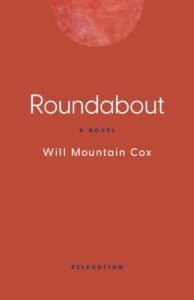
Roundabout by Will Mountain Cox is available from Relegation Books.



